Nigeria Health Workforce Management Activity Hosts First Annual National Dialogue on Human Resources for Health in Abuja
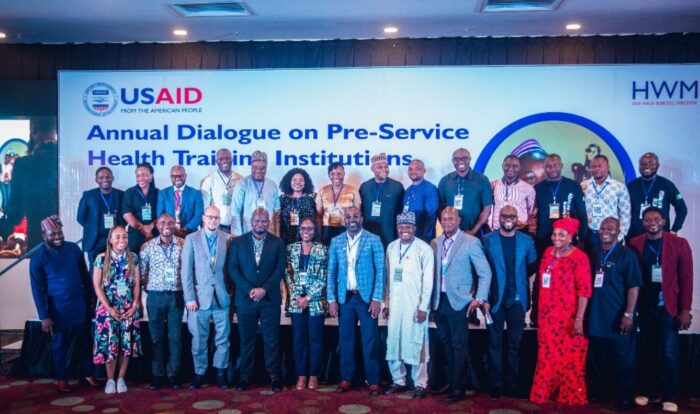
On July 27, 2023, the United States Agency for International Development (USAID)/Nigeria Health Workforce Management (HWM) Activity hosted its first annual National Pre-Service Health Training Institutions (PSHTIs) Dialogue on Human Resources for Health (HRH) at the Abuja Continental Hotel. The Dialogue convened stakeholders across the Federal and State Governments, professional health regulatory bodies, PSHTIs (officials and students), donor agencies, implementing partners, and the private sector to discuss HRH challenges across Nigeria, particularly in Bauchi, Ebonyi, Kebbi, and Sokoto States and the Federal Capital Territory (FCT).
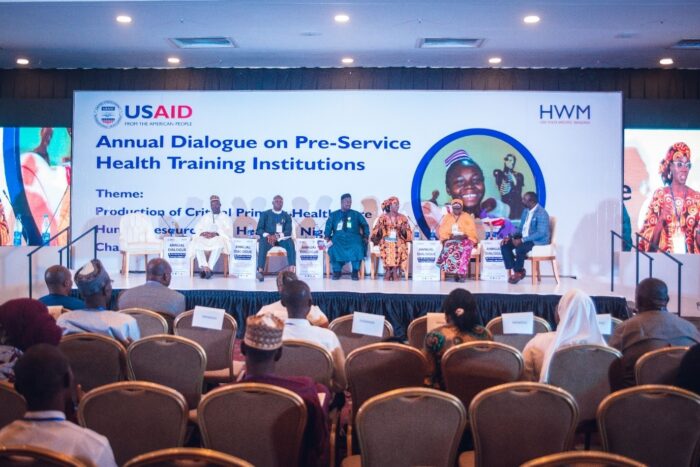
The Dialogue focused on the education and training of nurses, midwives and community health extension workers (CHEWs) for primary health care in Nigeria through strengthening the learning environment of schools of nursing and midwifery and health technology and developing a robust human resources information system (HRIS) to provide data for decision-making. Participating government institutions included the Federal Ministry of Health, State Ministries of Health, State Ministries of Higher Education, and the Commissioners for Health Forum.
In his welcome presentation, HWM Activity Country Director Anddy Omoluabi stated that Nigeria faces major issues in producing, deploying, motivating, and retaining health care workers, particularly in rural and hard-to-reach areas of the country.
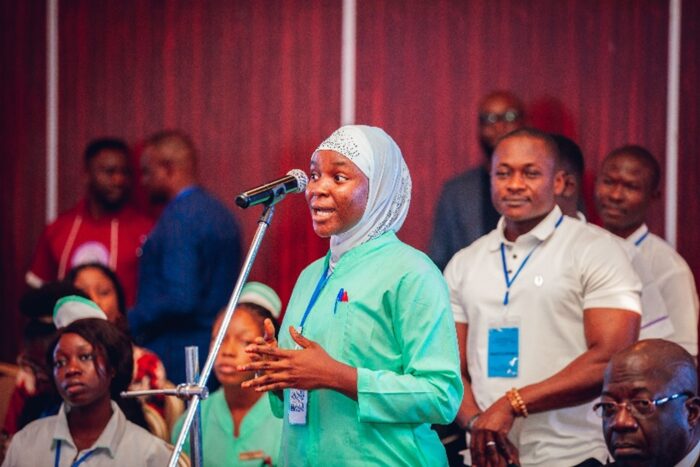
“Many health care workers have migrated to other countries with better working conditions, and an estimated 11,400 trained nurses and midwives leave the country each year,” said Omoluabi. “A strong health system requires adequate HRH.”
Omoluabi also noted that nurses, midwives, and CHEWs play a vital role in improving health outcomes through the basic and essential health services that they provide to the population, especially women and children.
“Nigeria must increase its efforts to meet the WHO’s standard of a ratio of 5.9 nurses and midwives per 1,000 people,” said Omoluabi. “The production of these cadres, as well as the quality of training provided by the country’s PSHTIs therefore requires immediate attention.”
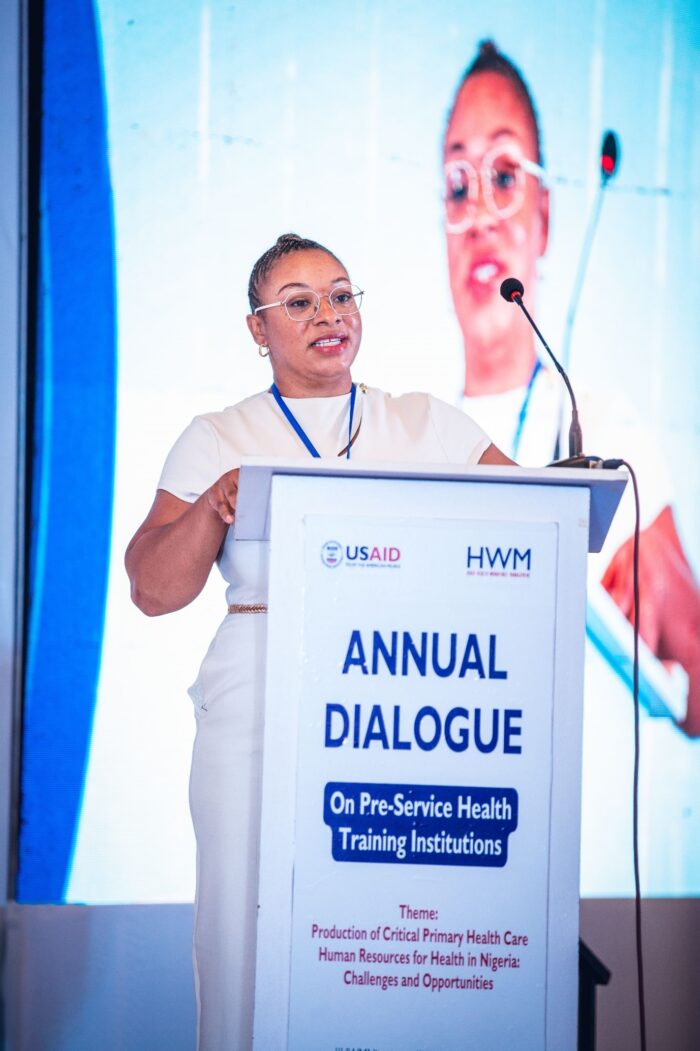
USAID/Nigeria Health Population and Nutrition (HPN) Office Acting Director Mieko McKay added to the sense of urgency saying, “Nigeria shoulders over 34 percent of the global burden of maternal death, and is now the world’s highest contributor to the deaths of children under the age of five years. The United States Government is working closely with the Government of Nigeria to change this reality through several interventions including the HWM Activity.”
McKay said that it is critical to support professional regulatory bodies and PSHTIs to foster a conducive learning environment to improve the quality of training of pre-service health workers.
“We know that the state of the learning environment and availability of good tutors are essential to improving PHC, as they develop students that are fit for purpose and fit to practice in the health workforce,” said McKay. “To get good quality tutors, we must be deliberate in the formation, adoption, and implementation of sound policies… Today, USAID challenges the Government of Nigeria at all levels to make additional investments to improve the quality of pre-service health training. We call on the leadership of the PSHTIs to improve accountability and prudence in the management and resources, and we encourage students and tutors to demonstrate positive behaviors that promote supportive and collaborative learning.”
NANA Women and Girls Empowerment Initiative (an HWM grantee) Executive Director and keynote speaker Fatima Adamu said that attitudes must change.
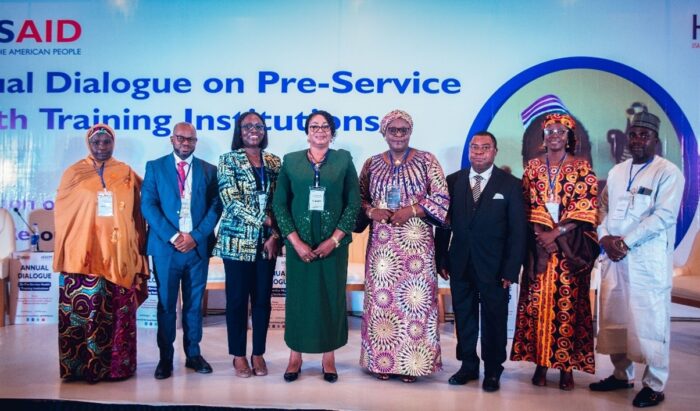
“We must attach value to our investments in the PSHTIs as we do with the other tertiary institutions,” said Adamu. She continued saying politicians should strike a balance between investing in health infrastructure and the human resources who will manage it. Adamu encouraged PSHTIs to be more accountable for the resources that come from the government and those that they generate themselves.
The two panel discussions that followed focused on student admission, the curricula, the student learning environment, tutor capacity, and examinations. The panelists included representatives of the Community Health Practitioners Registration Board of Nigeria (CHPRBN), the Nursing and Midwifery Council of Nigeria (NMCN), PSHTIs (both public and private), and HWM consortium partners Solina Health (a local partner), and the Institute for Healthcare Improvement (IHI).
The HWM Activity is now working to develop briefs based on the recommendations from the Dialogue. HWM will use these briefs to advocate with the Federal and State Governments and the private sector.
